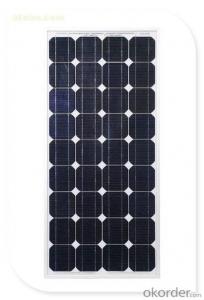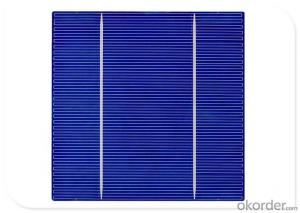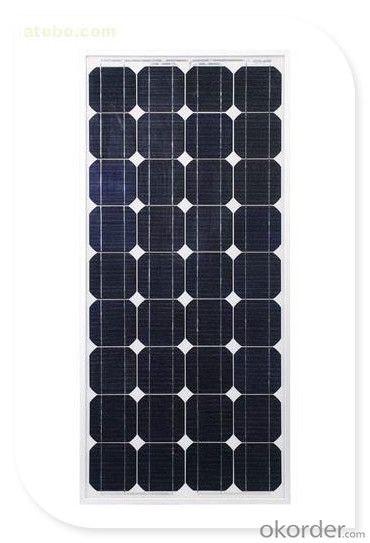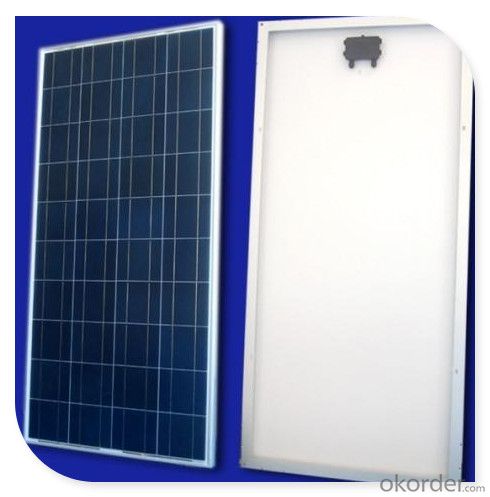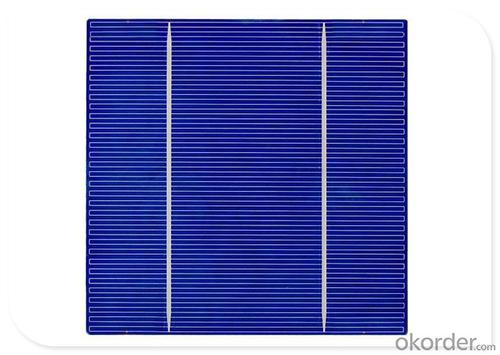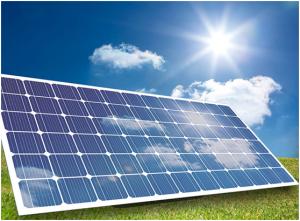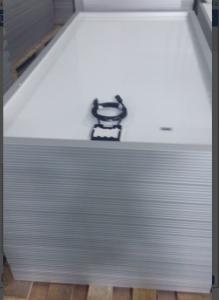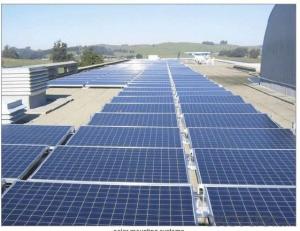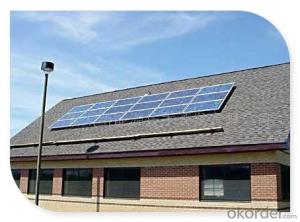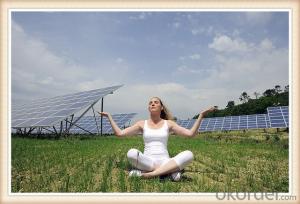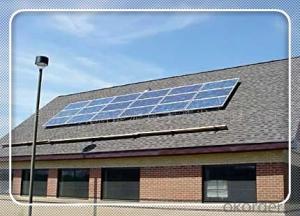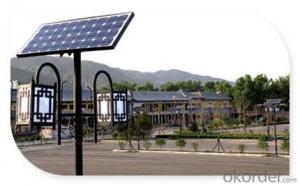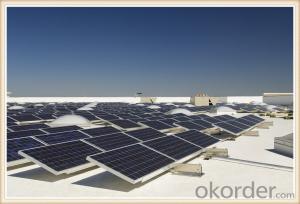Eagle Solar Panels - 20w Efficiency Chinese Solar Panels for Sale 5-200w
- Loading Port:
- China main port
- Payment Terms:
- TT OR LC
- Min Order Qty:
- 10000 watt
- Supply Capability:
- 100000 watt/month
OKorder Service Pledge
OKorder Financial Service
You Might Also Like
Specification
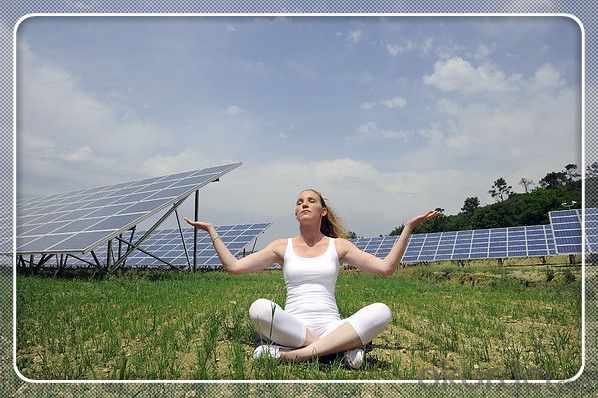
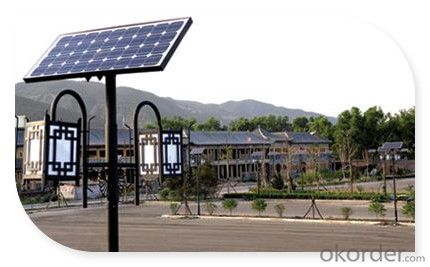
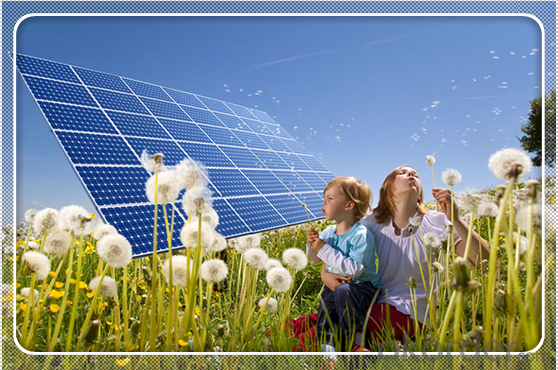
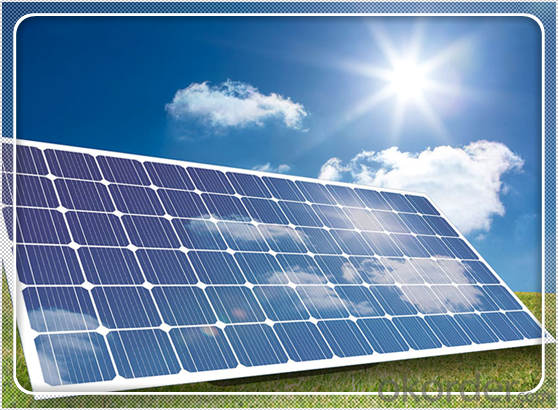
Solar Module Introduction
Solar Module is the core part of solar PV power systems, also is the highest value part of it. The function of Solar Module is to convert the sun's radiation to electrical energy, or transfer it to battery and store in it, or to drive the load running.
The Product has been widely used in space and ground, it mainly used for power generation systems, charging systems, road lighting and traffic signs areas. It could offer a wide range of power and voltage, and with high conversion efficiency, and long service life.
Solar modules use light energy (photons) from the sun to generate electricity through the photovoltaic effect. The majority of modules use wafer-based crystalline silicon cells or thin-film cells based on cadmium telluride or silicon. The structural (load carrying) member of a module can either be the top layer or the back layer. Cells must also be protected from mechanical damage and moisture. Most solar modules are rigid, but semi-flexible ones are available, based on thin-film cells. These early solar modules were first used in space in 1958.
Electrical connections are made in series to achieve a desired output voltage and/or in parallel to provide a desired current capability. The conducting wires that take the current off the modules may contain silver, copper or other non-magnetic conductive transition metals. The cells must be connected electrically to one another and to the rest of the system. Externally, popular terrestrial usage photovoltaic modules use MC3 (older) or MC4 connectors to facilitate easy weatherproof connections to the rest of the system.
Secification
Model Type | |
Peak Power-Pmax(W) | 5-200W |
Open Circuit Voltage-Voc(V) | 44.2 |
Maximum Power Voltage-Vmp(V) | 36 |
Short Circuit Current-Isc(A) | 5.4 |
Maximum Power Current-Imp(A) | 5 |
Maximum System Voltage | 1000V DC |
Maximum Series Fuse Rating | 10A |
Power Tolerance | -1~+3% |
Temperature Coefficients of Pmax | -0.45%/℃ |
Temperature Coefficients of Voc | -0.348%/℃ |
Temperature Coefficients of Isc | 0.031%/℃ |
Nominal Operating Cell Temperature | 44.5±2℃ |
Standard Testing Condition(STC) | Irradiance:1000W/m²;Temperature:25℃;AM=1.5 |
Qualification Test Parameters | |
Operating Temperature | -40℃~+85℃ |
Storage Temperature | -40℃~+85℃ |
Pressure Bearing | ≥5400Pascal/m² |
Wind Bearing | ≥5400Pascal/m² |
Mechanical Characteristics | |
Cell Size | Mono 125*125mm±0.5 |
No.of Cells | 72pcs(6*12) |
Dimension | 1580*808*40mm |
Weight | 15.5Kg |
Glass | 3.2mm High Transmission,Low Iron |
Frame | Anodized Aluminum Alloy |
Junction Box | IP65Rated |
Internal Diodes | 3 Bypass Diodes |
Cable | 1*4.0mm² Length 900mm |
Images
Packing & Shipping:
We have rich experience on how to pack the panels to make sure the safety on shipment when it arrives at the destination.
The normal size is packed by 25pcs/ carton / pallet. Paper carton for FCL shipping and wood carton for LCL shipping.
Warranty:
For c-Si panel: 25years output warranty for no less than 80% of performance, 10 years output warranty for no less than 90% of performance. Free from material and workmanship defects within 5 years.
For a-Si panel: 20 years output warranty for no less than 80% of performance, 10 years output warranty for no less than 90% of performance. Free from material and workmanship defects within 2 years.
FAQ:
(1)What price for each watt?
It depends on the quantity, delivery date and payment terms.
(2)What is your size for each module? Can you tell me the Parameter of your module?
We have different series of panels in different output, both c-Si and a-Si. Please take the specification sheet for your reference.
(3)Can you provide the peripheral products of the solar panels, such as the battery, controller, and inverter? If so, can you tell me how do they match each other?
Actually we are only manufacturer of solar panels, but we could try to source them for you in China if you need. We could provide you an optimal system design to instruct you how to install.
(4)Do you have the CE, TUV, UL Certification?
We’ve already passed all the tests, and any certificate is available.
(5)Have you ever sold your products to companies in my country?
Of course, we have customers in all general PV markets, but I think we should expand our market share along with the market growth.
(6)When did your company set up? You are a new company, how can I believe your quality?
We entered into Solar PV industry in 2005, now we have several plants in manufacturing of a-Si and c-Si panels, and our capacity is 220MW per year. Till now we have already passed all the tests by authorized laboratories, e.g. TUV, VDE, UL.
(7)Can you help us install the module if we cooperate with you?
We haven’t entered into installation sector, but we have the plan in near future.
(8) How do you pack your products?
We have rich experience on how to pack the panels to make sure the safety on shipment when it arrives at the destination.
(9) Can you do OEM for us?
Yes, we can.
(10)Can we visit your factory?
Surely, I will arrange the trip basing on your business schedule.
- Q: If you were to be asked to write a material(s) report on either -solar panelsor -aircraft fuselageWhich would you choose?well i was asked to choose between these two,so i guess that if i choose what the majority wouldn't, i might just score a little bit higher,what do you think?if you are the lecturer you would want something different right?
- Aircraft fuselage. Right now solar panels are all the rage, and there's lots and lots of nonsense written about them. Aircraft design is old technology, but still quite fascinating. Learn about riveting and gluing techniques, the various aluminum alloys or plastics used, and compare the weight of an airplane fuselage with that of a building of comparable size.
- Q: About how much would it cost to purchase and install solar panels for the average American house so that the house can be off the power grid and use the same amount of electricity as it normally does?
- I had a survey of my home and it was estimated at $30K with a 30% rebate from the government. It would take about 5 years to pay back the cost. I elected to go solar water heating instead. 2 panels with piping installed to an 80 gallon electric water heater with an internal heat exchanger. One small photo voltaic panel to run the pump. There is ethylene glycol inside the pipe and it circulates and heats the water. Works excellent. I live in Nor-Cal and we get a lot of sun. I need to comment on another statement that photo voltaic cells cost more energy to produce they generate. Maybe once but not true any longer. {Solar cells and energy payback In the 990s, when silicon cells were twice as thick, efficiencies 30% lower than today and lifetimes shorter, it may well have cost more energy to make a cell than it could generate in a lifetime. The energy payback time of a modern photovoltaic module is anywhere from to 20 years (usually under five)[9] depending on the type and where it is used (see net energy gain). This means solar cells can be net energy producers, meaning they generate more energy over their lifetime than the energy expended in producing them}
- Q: How do solar panels convert sunlight into electricity?
- Solar panels convert sunlight into electricity through a process called the photovoltaic effect. When sunlight hits the solar panels, the photons in the sunlight excite the electrons in the solar cells, allowing them to flow and create an electric current. This current is then captured and converted into usable electricity, which can power various devices and homes.
- Q: Okay, I think I understand what I'm doing, but I want to set up some solar panels on the roof of my garage, the building that gets the most sun, and I want to make sure all my math is correct in determining number of megawatts per year. However, my knowledge of electrical terms in quite n00bish, to say the least.Here is what I think I should be doing.The solar cells come at .75 Watts average power.I will install 4 panels of 64 cells each, with a total of 256 cells.
- For comparison, 36 of these make a normal 2V x 50W panel. Note they are not tabbed. This means you have to find a way to connect them yourself. The tabs are probably spot welded on by the suppliers. A supplier below has kits of these with tabs, as needed to connect them together. These are not suitable for grid connect, because the higher voltage needed makes do it yourself panels a dangerous and litigious thing to have on your roof. Maybe you could buy a smaller pack from the link below to compare tabbed and untabbed and work out what to do. Your power calculation is a bit incorrect because the sun is only present some of the time. The 36 cell module would produce 50W when square on to the full sun. The sun may be out for around 2h a day in some places and times of the year. However it is the equivalent of 5h full sun, because of the changing angle throughout the day. Look this up on the internet for your region. Temperate zones may be a lot less. One pack in your link is 36x3 = 08 cells. Thus 50W per pack x 5h a day gives 750Wh per day and 274KWh/y. In reality it will always be less because of regions, weather, clouds, dust, inefficiencies, aging of cells.
- Q: about solar panel
- The answer depends upon the type of solar energy captured . Photovoltaic Solar Panels convert the energy into electricity. This electricity is ran throughout the building via wires. Thermal Solar Panels typically capture the energy in the form of heat. The hot water is circulated through the building in water pipes.
- Q: Can solar panels be installed on historical buildings?
- Yes, solar panels can be installed on historical buildings. However, it requires careful planning and consideration to ensure that the installation does not compromise the building's historical integrity. Various techniques can be employed, such as integrating solar panels into existing structures, using non-penetrating mounting systems, or placing panels in less visible areas. Preservation guidelines and local regulations should be followed to maintain the historical significance while promoting sustainable energy.
- Q: Aren't batteries bad for the environment?Toxic?Expensive? With small solar panels phones, iPod's, laptops other small electronics could be smaller, slimmer, more efficient cost people less to charge every day. Maybe a small battery inside as a backup and to store the Solar energy for night time. But overall, batteries should be optional. So big question:Why aren't electronics being produced with solar panels?
- Solar panels could still be expensive, which would also raise the cost of the item.They also are made with chemicals that harm that enviroment(not too badly, but ya know..) You would also need to charge them, of course, in sunlight and most people enjoy the benefit being able to plug something in and still being able to use it. Not saying it's a bad idea, just the world we live in.
- Q: how to use a motor with solar panel
- You need a battery, no solar panel is strong enough to move any significant motor
- Q: Can solar panels be installed on a commercial building?
- Yes, solar panels can be installed on a commercial building. In fact, many businesses and organizations are increasingly adopting solar energy to reduce their carbon footprint and save on energy costs. Installing solar panels on commercial buildings can help generate clean, renewable energy and contribute to a more sustainable future.
- Q: I have a building company in UK and am interested in becoming a solar panel installation contractor
- Every single solar system will have to be put on every roof by people. Of course much of the processes used installation are designed to be as pain free and trouble free (and therefore as inexpensive) as possible but in a typical British street of semi detached houses built in the 930s you could find as many different plumbing and heating systems as there are houses, so you will never be able to remove the human installation element.
Send your message to us
Eagle Solar Panels - 20w Efficiency Chinese Solar Panels for Sale 5-200w
- Loading Port:
- China main port
- Payment Terms:
- TT OR LC
- Min Order Qty:
- 10000 watt
- Supply Capability:
- 100000 watt/month
OKorder Service Pledge
OKorder Financial Service
Similar products
Hot products
Hot Searches
Related keywords
